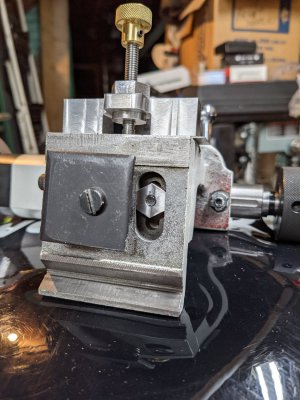I'm trying to make a differential screw. This is a screw that has two threads so that the amount of movement is very small (the net effect is that the total forward movement is the difference between the two thread pitches. The concept is described on this web site:
link
I thought the best way to make the screw would be to start with a M5 socket head bolt. The one I had handy was a 60mm long Class 12.9 alloy steel black oxide finish. Since this was only threaded on the last 25mm, I wanted to do three operations.
I constructed a die holder. Even machined the mt3 tape successfully. I was easily able to remove the existing M5 threads (operation #2) with no problem. I was totally unable to thread using dies for operation #1 and #3.
I can't single-point cut the M4 threads with the gears I got with the lathe (no .7 pitch available). I plan to do the electronic leadscrew someday, but only after installing a DRO.
The die was from Harbor Freight. However, I've used taps from the same set for quite a while and they aren't that bad.
I have a new and hopefully better die (HSS and it has the adjuster) on the way.
If worse comes to worse, I have a CNC mill that I built. This differential screw adjuster doesn't need a ton of strength , so I could threadmill all the threads I need in aluminum. But, my lathe is new and I don't want to give up on it!
Comments and advice would be appreciated!
link
I thought the best way to make the screw would be to start with a M5 socket head bolt. The one I had handy was a 60mm long Class 12.9 alloy steel black oxide finish. Since this was only threaded on the last 25mm, I wanted to do three operations.
- Extend the M5 threaded area another 15 mm or so (using a die).
- Turn the last 20 mm of the bolt to remove the 5mm thread and leave a 4mm section.
- Use a die to create M4 threads on the turned area, about 20 mm in length.
I constructed a die holder. Even machined the mt3 tape successfully. I was easily able to remove the existing M5 threads (operation #2) with no problem. I was totally unable to thread using dies for operation #1 and #3.
- No matter how tight I cranked the ER40 collet, the bolt moved during the threading attempts (turned relative to the chuck and slipped deeper into the chuck). Any guidance on how to hold a bolt like this would be appreciated. And it's possible that the hold pressure would be sufficient if the dies were working.
- The dies seemed to require inordinate force. I could barely get the M5 die to turn when going over the store-bought bolt M5 section. When I reached the unthreaded part, the die would get a few turns and then nothing could move it. In either direction. Actually had to remove the collet and cut the bolt to get my collet back. The piece stuck in the die was not removable. I was turning the right direction. The die was M5 and the bolt was M5. I did have the chamfered end of the die pointed towards the bolt to start.
I can't single-point cut the M4 threads with the gears I got with the lathe (no .7 pitch available). I plan to do the electronic leadscrew someday, but only after installing a DRO.
The die was from Harbor Freight. However, I've used taps from the same set for quite a while and they aren't that bad.
I have a new and hopefully better die (HSS and it has the adjuster) on the way.
If worse comes to worse, I have a CNC mill that I built. This differential screw adjuster doesn't need a ton of strength , so I could threadmill all the threads I need in aluminum. But, my lathe is new and I don't want to give up on it!
Comments and advice would be appreciated!


